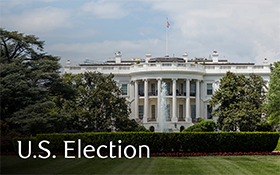In this week’s economic update, we are speaking to the outcome of the U.S. elections and the impact that has had on the U.S. equity market. Specifically, we're examining the factors that led to a post-election boost, the relationship between the impact of a new government and investing, as well as more details on third-quarter earnings.
We are sharing a great article from RBC Wealth Management that analyzes the outcome of the U.S. election and the potential impacts of the new administration's anticipated policies on markets. The bottom line is: other factors tend to dictate U.S. stock performance more than who sits in the Oval Office and which political party controls Congress.
Finally, we would like to shine a light on NovemBurger, in support of the United Way Guelph Wellington Dufferin and their mission to address food insecurity in our community.
Economic Update
Investors have been closely focused on the U.S. election in recent weeks, with Donald Trump elected 47th president of the United States. Both U.S. and Canadian equity markets reached new all-time highs after a post-election boost, while markets overseas have trended lower. Amid this election rally, U.S. economic data has largely surprised to the upside. This, in addition to some suggestions that inflation and interest rates may remain higher under a Trump administration, has contributed to rising bond yields, even as the U.S Federal Reserve cut interest rates for a second consecutive time at its latest meeting. Below, we share some thoughts on equity markets in the wake of recent developments.
Election outcome influencing sentiment on deregulation and tax reductions
Equity markets often rally as uncertainty recedes, which likely explains some of the recent market gains. Rather than the close and potentially contested outcome many feared, Donald Trump was decisively announced as president in the early hours following election night. Markets may also be enthused by the potential for deregulation and tax cuts to spur higher growth and offset any potential drags from proposed immigration reforms and tariffs. These sentiments were echoed by companies reporting earnings after the election. Some expressed optimism about regulatory easing and tax reductions, while others suggested they are wary of proposed tariffs.
Central banks, economic cycle, and corporate earnings still important
In addition to winning the White House, the Republican party secured control of both chambers of Congress. With a majority in both the Senate and the House of Representatives, Trump should face less resistance in advancing his agenda. However, that does not necessarily mean he has a blank check. Republicans can still vote to oppose certain policies and push for concessions. The financial markets can also function as an important feedback mechanism, with bond markets having sometimes reacted sharply to major shifts in fiscal policy. While it is important to appreciate the potential impact of a new government, we think central banks, the economic cycle, and corporate earnings growth tend to have more influence on investor returns over time. For those looking for more detail on the election and its potential impacts, see a recent report by our firm here.
Third quarter economic growth in the U.S.
The U.S. third-quarter earnings season is nearly complete and has been less remarkable than recent quarters, though markets appear unfazed. Company profits grew around 8%, roughly double expectations. And earnings are forecasted to grow by nearly 13% year-over-year in 2025, the strongest pace since 2021. Encouragingly, more of this growth is expected to come from a wider swath of sectors, suggesting a broadening in the earnings story and less reliance on the large-cap tech sector. Moreover, pro-growth policies from the new administration may further support earnings next year.
U.S. stock market reflecting a lot of positivity
The strength witnessed by North American equity markets this year have been impressive, with stock indices up over 20%. Ironically, these gains have exacerbated one of the main concerns we have had around stocks: valuations. From a valuation perspective, the U.S. stock market’s price-to-earnings ratio—a key measure reflecting how much investors are willing to pay per dollar of expected earnings—stands just above 22. This is well above its historical average. And while this tells us little about how equities will perform in the months to come, it does suggest that the U.S. stock market is reflecting a lot of positivity, optimism, and lofty expectations for future earnings growth. We have often used periods like this to recalibrate and lower our expectations around longer-term returns from a specific asset class when it has traded at similar premium levels. Fortunately, this particular dilemma is more tied to U.S. stocks and less so to the Canadian equity market, where valuation levels are less demanding.
Analysis: U.S. presidential election: Back to the future

In a historic political comeback, Donald Trump has again won the presidency, only the second person in American history elected to two non-consecutive presidential terms.
With the outcome of the election, focus has shifted to the factors giving investors cause for optimism and concern. In this article from RBC Wealth Management, we learn how anticipated policies like taxes and tariffs are shaping the investment climate. With political polarization high, it continues to be important to remove emotion from investment decisions.
You can read the article by clicking here.
1st Annual NovemBurger is here – there’s still time to grab a burger

We are proud to be presenting sponsors for the 1st Annual NovemBurger, in support of the United Way Guelph Wellington Dufferin.
Until the end of November, you can grab a NovemBurger creation from any participating restaurants: not only do you get to enjoy and vote on our community’s best NovemBurger, $2 from every burger sold goes to the United Way’s food insecurity programs.
As always, we are available to connect with you personally. Please don’t hesitate to contact us at 519-822-2024 or elineskyschuett@rbc.com.
